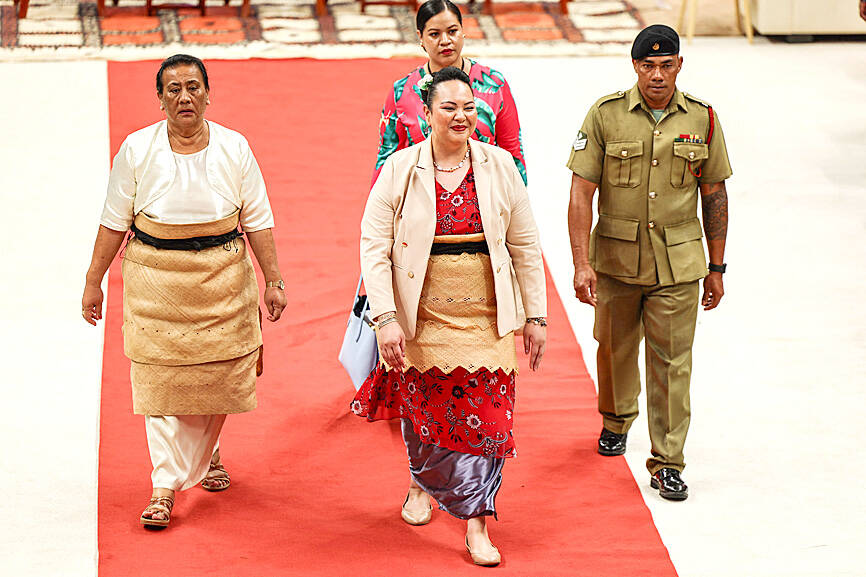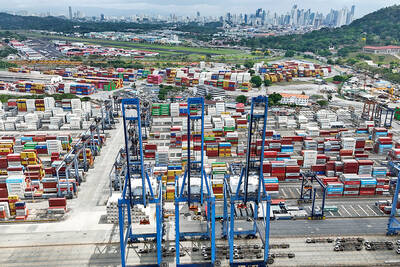Emissions-belching nations yesterday were challenged to stump up for climate-related damage as a key Pacific islands summit opened, with low-lying Tuvalu declaring: “If you pollute, you should pay.”
The Pacific Islands Forum got underway in Tonga’s capital, Nuku’alofa, with leaders hoping to draw global attention to the region’s worsening climate plight.
“We really need to ensure that we continue to push for action from countries that are the most polluting,” Tuvaluan Minister of Home Affairs, Climate Change and Environment Maina Talia said on the sidelines of the summit. “Polluter pays should be on the table.”

Photo: AFP
Pacific leaders are to mount a renewed push later this week for a homegrown climate adaptation fund, an idea that largely hinges on financial contributions from foreign nations. They are also to push to speed the transition away from oil, gas and other highly polluting fuel sources.
“We cannot address climate change without addressing the root cause, which is the fossil fuel industry,” Talia said. “It’s disaster after disaster, and we are losing the capacity to rebuild, to withstand another cyclone or another flood.”
That is awkward for forum member Australia, a coal-mining superpower belatedly trying to burnish its green credentials.
Australia wants to cohost the COP31 climate conference alongside its Pacific neighbors in 2026, but first, it must convince the bloc it is serious about slashing emissions.
UN Secretary-General Antonio Guterres is making a rare appearance at the summit, in a trip designed to highlight the Pacific’s myriad climate threats.
“The decisions world leaders take in the coming years will determine the fate, first of Pacific Islanders, and then everyone else,” Guterres said. “If we save the Pacific, we save the world.”
Foreign dignitaries were briefly sent scuttling for cover when a magnitude 6.9 earthquake struck off Tonga’s coast early yesterday, but no major damage or injuries were reported, and no tsunami warning was issued. The summit had earlier began with melodic Tongan choir singers and dancing schoolchildren in traditional dress.
However, beneath the bonhomie rare fissures have been forming in the 18-member bloc, with Pacific nations torn over China’s security ambitions in the region.
“We gather at a pivotal time in our region’s history,” forum secretary and former Nauruan president Baron Waqa said. “We are at the center of global geopolitical interest.”
China’s interest, specifically, was evident long before Waqa’s opening speech. Large “China Aid” signs were installed outside the newly built conference venue, a US$25 million gift from Beijing.
Meanwhile, the US has dispatched US Deputy Secretary of State Kurt Campbell to lead its forum delegation. Campbell has been one of the key figures behind a US-led push to keep China’s Pacific ambitions in check.
“We need to remain vigilant on issues of regional security,” said Waqa, who has taken a dim view of the escalating Beijing-Washington rivalry in the past.
The other pressing security challenge facing Pacific leaders is the unresolved crisis in French territory New Caledonia, which reared its head on the opening day.
“We must reach consensus on our vision for a region of peace and security,” Tongan Prime Minister Siaosi Sovaleni said. “We must honor the vision of our forefathers regarding self-determination, including in New Caledonia.”
Much of New Caledonia’s ethnically Melanesian Kanak population fears that voting reforms put forward by Paris could crush their dreams of independence.
It is a cause that resonates widely in the Pacific bloc, which is stacked with former colonies now fiercely proud of their hard-won sovereignty.
The fractious topic of deep-sea mining does not sit on any official agenda, but is likely be a topic of heated debate behind closed doors. Forum host Tonga sits at the vanguard of nations eager to open up the emerging industry, joined by fellow forum members Nauru and the Cook Islands, but others such as Samoa, Palau and Fiji see it as an environmental catastrophe in the making, giving their full-throated backing to an international moratorium.

THE TRAGEDY OF PUNCH: Footage of the seven-month-old Japanese macaque has gone viral online after he was rejected by his mother and formed a bond with a soft toy A baby monkey in Japan has captured hearts around the world after videos of him being bullied by other monkeys and rejected by his mother went viral last week. Punch, a Japanese macaque, was born in July last year at Ichikawa City Zoo. He has drawn international attention after zookeepers gave him a stuffed orangutan toy after he was abandoned by his mother. Without maternal guidance to help him integrate, Punch has turned to the toy for comfort. He has been filmed multiple times being dragged and chased by older Japanese macaques inside the enclosure. Early clips showed him wandering alone with

South Korea would soon no longer be one of the few countries where Google Maps does not work properly, after its security-conscious government reversed a two-decade stance to approve the export of high-precision map data to overseas servers. The approval was made “on the condition that strict security requirements are met,” the South Korean Ministry of Land, Infrastructure and Transport said. Those conditions include blurring military and other sensitive security-related facilities, as well as restricting longitude and latitude coordinates for South Korean territory on products such as Google Maps and Google Earth, it said. The decision is expected to hurt Naver and Kakao

Australian Prime Minister Anthony Albanese yesterday said he did not take his security for granted, after he was evacuated from his residence for several hours following a bomb threat sent to a Chinese dance group. Albanese was evacuated from his Canberra residence late on Tuesday following the threat, and returned a few hours later after nothing suspicious was found. The bomb scare was among several e-mails threatening Albanese sent to a representative of Shen Yun, a classical Chinese dance troupe banned in China that is due to perform in Australia this month, a spokesperson for the group said in a statement. The e-mail

‘OCCUPATION’: Hong Kong said it had lodged ‘stern protests’ with Panama’s consulate, and would ‘staunchly support’ the rights and interests of Hong Kong companies Panamanian President Jose Raul Mulino on Monday ordered the temporary occupation of two ports run by a unit of CK Hutchison Holdings Ltd following the Supreme Court’s ruling against the firm’s concession, escalating a dispute that has become a proxy battle between the US and China in Latin America. Mulino said in a speech that the administration and operation of the two ports on the strategic Panama Canal is to revert to the country’s National Maritime Authority to ensure their uninterrupted, safe and efficient operation. The occupation covers movable equipment at the ports and does not mean a definitive loss of